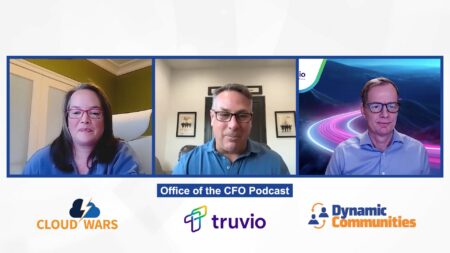Unfortunately, there seems to be no “one size fits all” solution for enterprise solutions. A realization that has started to drive many enterprises into the cloud to seek vertical, industry-specific solutions. However, as cloud solutions continue to evolve, enterprises are finding it easier to shift from horizontal to vertical, industry-tailored applications and cloud services.
For the most part, public cloud software vendors started off with horizontal applications, which fit a wide variety of customer types. Fast forward to the present, those same vendors (and many newer ones) are addressing the evolving demands of modern enterprises by building solutions that are more vertical in nature. Both enterprises and the vendors supporting those enterprises have realized that verticalization is a primary strategy to help them stay ahead of the curve and prioritize what’s most important: the customer experience.
For many businesses in the past, moving core business applications to general public clouds was burdensome because they had so heavily customized on-premise applications or legacy industry-specific software. Moving to the cloud would mean sacrificing required functionality, or necessitating customizations that are time-consuming and costly.
The rise of industry cloud software has the potential to accelerate digital business, lower the risk of cloud migrations, and provide an enticing proposition for many businesses that have been slow in the move to cloud applications.
Benefits & Longtail Effects of Verticalization
Verticalization brings both immediate and long-tail benefits to the vendors, consulting partners, and end customers who utilize this approach. For vendors and partners, it requires hiring and training industry-specific focused experts within all core job functions of the organization, particularly within the sales and product development.
This focus allows for a greater level of understanding of customer business needs, industry best practices, and development of niche customer references and materials and a keen understanding of industry-specific trends and nomenclature. It also helps attract and build credibility with potential customers during the sales process and implementation. Software vendors that view the market in verticals and build for these audiences will also drive better adoption of the technology, decreased training time, and build more loyal customers.
For customers, this approach provides immediate access to tools and applications optimized for specific industry use cases, as well as APIs, common data models, and workflows tailored to common needs. Choosing a software vendor and partner who have deep industry knowledge and expertise can provide access to best practices and methodologies that would not be possible with horizontal software and cloud services.
Verticalization Challenges That Providers Face
Conversely, the benefits of verticalization can cause challenges for software vendors and consulting firms who lead transformation efforts with clients. For example, with a focus on creating unique products and experiences for each vertical, there’s an expectation to build highly customized functional tools while also being on the leading edge of technology.
If a vendor or partner focuses on multiple industries (as many do), the same quality of people and product expertise needs to cross all vertical business units. In addition, every product line needs to have integration capabilities with various other industry-specific software. Market factors may also impact supply and demand. For instance, during the height of the Covid pandemic, demand for digital transformation projects and software for retail and healthcare soared, while higher education waned.
Also, staffing and resources will be impacted differently depending on the industry’s economic climate. While every industry may have similar needs for 75% of a particular type of functional software, the tailoring and nuances of the other 25% can be vastly different. For example, in a Human Capital Management (HCM) system, all companies need to hire, compensate, and manage employees. But the nuances between a predominantly white-collar financial services organization are vastly different than that of a retailer with a highly distributed, predominantly hourly workforce.
For Customers: What To Consider
- Support to Scale & Team Resources with Industry Expertise
One of the greatest benefits of cloud applications is the scalability it enables within organizations. Decision-makers should look at vendors that can support their future state organization and make it easily possible. Vendors who can clearly demonstrate examples of other customers of the same size and scale, with support staff and partners who are trained not only as system technicians but who have a high degree of industry expertise, are key considerations.
The cloud also enables organizations to reap the benefits of instantaneous software updates and constant data backup, helping to keep their organizations running safely and securely with minimal maintenance required. Server response time is reduced and strengthened around the globe, making it possible to offer more reliable service to customers regardless of location. Other organizations might be looking for scalability and support to automate and accelerate an area of their business or to support the expansion of a new service line.
For retail organizations, curbside pickup didn’t exist five years ago. However, with a strong technology stack and cloud infrastructure behind them, retail organizations were able to use their software to create a new experience for their customers—from having visibility into store-specific inventory to being able to notify team members of which parking spot they’re in for curbside pickup.
This need doesn’t end with the cloud software, though. Such a large change in cloud infrastructure requires a strong implementation partner to help make the most of your new software. Your chosen partner needs to have a team of experts that knows how to maximize your choice for your industry and be familiar with the way that their chosen software can scale, including any limitations it brings.
Overall Customer Satisfaction is higher when a Support Team’s System Expertise is Rated Well
Peer review site Raven Intelligence measures project success through reviews written by customers who have recently gone through a digital transformation project. When a software implementation team’s Systems Expertise is rated at or above 4/5, the overall satisfaction score is likely to go up an average of 1.5 satisfaction points (out of 10.) Rather than adapt your processes to the software, your expert consultants should be helping you make the software work for your organization and understand how to work around any limitations that come with it, not the other way around.
“Experience and knowledge of consultant(s) are key,” commented the business lead from a manufacturing company implementing SAP SuccessFactors with Rizing HCM. “Ensure the consultant knowledge goes beyond theoretical and possesses practical system and implementation experience. Ability to understand and document business processes and practices and offer ‘best practice’ recommendations and translate those to system configuration are also key.”
- Intuitive & Forward-Thinking Experiences
A key benefit of industry verticalization is that cloud providers know exactly who their customers are, and they can build for their exact needs. Customers shopping for a cloud solution will expect intentionally-built solutions and will be quick to drop solutions that don’t truly cater to their requirements.
In order to do this, cloud providers will need to invest in a team of domain experts in any given industry they offer solutions within, allowing these teams to build based on their expertise and knowledge. Having “walked the walk” before, these experts will have a far better understanding of the functionality, integrations, and future enhancements needed for a successful and empowering customer experience that not only attracts customers but retains them.
This also enables the product builders to help anticipate new features that will be needed as the market changes, how they should be built, and how to prioritize enhancements. Time to market will also be decreased, as there won’t be extended time spent trying to learn or survey the market since the team behind the scenes isn’t new to the industry. These expectations will hold consistent to the consulting partners supporting implementations, as customers need partners who can help them think beyond “the way it’s always been done,” adopt best practices, and maximize their cloud solutions.
- Data Security & Compliance
The transition to remote work means that organizations are at increased risk of attack. Since March of 2019, the FBI has reported a whopping 300% increase in cybercrimes, phishing, and ransomware attacks, and consumer expectations and data security requirements only continue to rise. Customers seeking a new cloud provider will have specific requirements for data security, compliance, and regulation that must be addressed to even consider making a move to a new solution.
For healthcare cloud providers, HIPAA compliance and patient data will be at the forefront when designing the user experience, and that includes the authentication and user roles for accessing data. For financial institutions or organizations that process payments, being mindful of PCI DSS compliance will be critical when building software that creates user permissions, tracks activity, and protects cardholder information.
While these responsibilities ultimately fall back on the organization itself, cloud providers that check the box for their basic requirements are far more likely to acquire customers and retain them. The consulting partners supporting highly-regulated industries have even more pressure to be industry experts and will have a higher demand for certifications and experience in a given requirement, as a misunderstanding of a requirement or process can have drastic impacts to the organization and its ability to service customers.
- Enhanced Focus on Collaboration
As customer expectations continue to rise, an enhanced focus on collaboration will also be non-negotiable when looking for the right industry cloud solution. Communication and collaboration may no longer happen in the physical places they used to, but that doesn’t make them any less critical to the success of an organization. Cloud software built right for an industry should break down barriers between departments and build trust between the customer and organization. Similarly, consulting partners will be held to the same standards, and organizations will expect strong communication and collaboration throughout the implementation experience.
For example, retailers need the ability to communicate with customers to let them know inventory levels, delivery estimates, and store information. Their cloud software must support these activities and requests. Likewise, doctors, nurses, and medical facilities need to be easily reachable and offer the ability to schedule and ask questions, while keeping patient data safe. This might also mean connecting various different operating systems into a single source of the truth to enable more efficient collaboration among teams.
Wrap Up
As organizations continue to turn to the cloud, the number of options available for them to choose from keeps growing. In order for these cloud organizations to be successful and meet the demands of their customers, verticalization and industry cloud solutions will be a key strategy to attract and retain users.
But that doesn’t mean verticalization won’t impose challenges. It will require software vendors and cloud services providers to invest in specialists for each vertical and educate their team to fully understand the customers’ needs. The most effective cloud vendors will be identified through their deep approach to industry-specific functionality, with strong internal teams and implementation partners to support customers in a variety of different industries.
For more on the fast-growing industry cloud market, see Acceleration Economy’s Industry Cloud Battleground Week, a digital event with in-depth presentations for healthcare, manufacturing, financial services, and retail.






